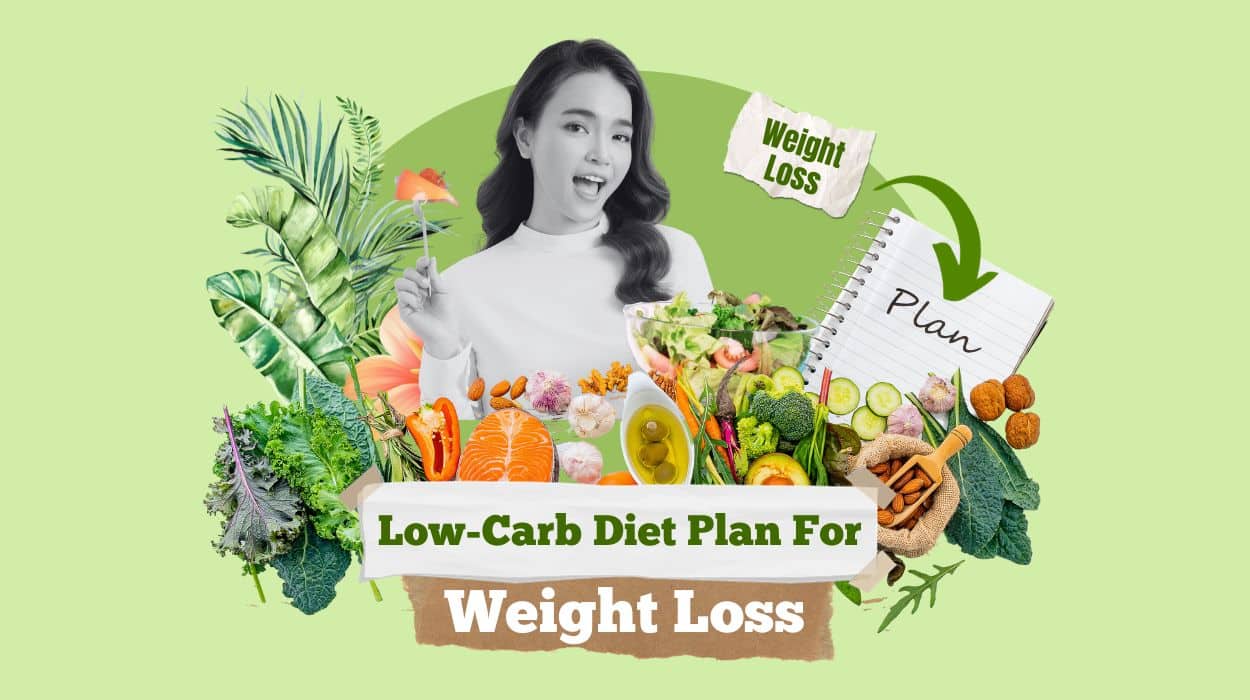Losing weight and maintaining that weight loss is an important indicator of health. Being overweight and obese is linked with various health ailments,[1] such as metabolic syndrome and insulin resistance, therefore maintaining a healthy weight is optimal. Decreasing the amount of carbohydrates that one consumes on a daily basis, while still consuming lean protein and healthy fat is a great way to lose weight and keep it off. There are various diet plans such as the keto diet, paleo diet, Dukan diet, intermittent fasting, and low-carb diet plan for weight loss.
However, ultimately it comes down to the consumption of healthy snacks for weight loss and exercise to boost energy and amplify workout performance. Consequently, it also becomes important to detox the system and reset it in order to maintain those weight modification results.
Low-Carb Diet Plan For Weight Loss
2-Day Sample Low-Carb Diet Plan For Weight Loss

Planning and preparing delicious meals for the weekend can be a challenge. Here are some ideas to help you create a meal prep plan that will keep you satisfied and nourished.
Day 1: Balanced Delight (approx. 955 calories)
| Breakfast | |
| Eggs | 2 large eggs |
| Vegetable Mix | Half a cup |
| Whole-grain bread | 1 slice |
| Butter | A teaspoon |
| Lunch | |
| Grilled Chicken Salad | 3 oz |
| Fresh fruit | 1 apple |
| Sugarless Bubbly Water | 1 bottle |
| Dinner | |
| Baked salmon | 3 oz |
| Mashed sweet potato | Half a cup |
| Cooked spinach | 1 cup |
| Herbal tea | 1 cup |
| Orange | 1 medium-sized |
Day 2: Nutrition Harmony (approx. 1201 calories)
| Breakfast | |
| Omelet with bell peppers and shredded sweet potatoes | 1 serving |
| Fruit cup | 1 cup |
| Black coffee | 1 cup |
| Lunch | |
| Avocado toast with poached egg | 1 serving |
| Turkey bacon | 2 slices |
| Fresh Fruit | 1 small banana |
| Dinner | |
| Roasted turkey breast | 3 oz |
| Green beans | 1 cup |
| Baked Yams | 1 medium |
| Herbal tea | 1 cup |
What Is A Low-Carb Diet Plan?
A low-carb diet plan offers numerous health benefits, including better blood sugar control and effective weight management. By emphasizing calorie intake while reducing carbohydrate consumption, this diet promotes healthier eating habits. This can be achieved through thoughtful meal planning and by limiting the consumption of sugary foods, sugar-sweetened beverages, and processed foods.
However, it is important to note that a low-carb diet plan for weight loss still requires the consumption of healthy calories from lean proteins like grilled chicken breast, as well as healthy fat sources such as olive oil. These nutrient-rich foods contribute to a prolonged feeling of fullness and help stabilize blood sugar levels, preventing cravings for high-carb foods.
A Comprehensive Food Guide For A Weight Loss Low-Carb Diet Plan
Foods To Avoid
Carb-containing foods that provide minimal nutritional value include vitamins, nutrients, and fiber. These foods[3] can include sugar-sweetened beverages, non-starchy vegetables, and processed foods that claim to have fewer carbs yet are loaded with a multitude of preservatives. Additionally, foods such as sour cream and cheddar cheese are packed with unhealthy fat and will do very little toward the goal of fat burning.
Foods To Eat
Carbohydrate-rich foods[4] that provide health benefits. Examples of these types of foods include cauliflower rice, Greek yogurt, whole grains, and unsweetened almond milk. Another great food to consume is olive oil for its anti-inflammatory properties. These types of foods provide you with minimal saturated fats, lean protein, and adequate fiber. Additionally consuming items such as chia seeds with Greek yogurt can make the perfect combination of carbohydrates, protein, and fiber.
Maybe Eat
In moderation, include foods like coconut oil and canola oil, but be mindful of their calorie content.
Ensure your meals include sufficient protein and fiber.
Drink
When starting on a low-carb diet, it is important to be mindful of your drinkable items.
- Be mindful of the carb content of beverages when following a low-carb diet.
- Seek out zero or low-net carb options when selecting flavored drinks.
- Consider carb-free carbonated drinks with natural flavoring as acceptable choices for low-carb diets. Therefore, certain beverages are perfectly acceptable within low-carb diets.
Some Healthy, Low-Carb Snacks
Incorporate raw vegetables with hard-boiled eggs and an olive oil-based dressing for a nutritious snack.
Opt for colorful, easy-to-prepare snacks that can be easily transported while adhering to dietary guidelines.
Cooking And Meal Preparation Suggestions
Knowing cooking basics is crucial for a low-carb diet to reduce expenses from eating out or buying specialty foods.
Explore low-carb recipes based on your favorite foods and find ways to make them with fewer carbohydrates.
Eating At Restaurants
It’s convenient to know some easy low-carb recipes, when you go to the supermarket you will have suggestions for your daily menu
Restaurants are difficult places to follow a low-carb diet and oftentimes you may feel like you are in fact eating more carbs. However, if you order foods that are high in protein and focus on carbs per serving you may have an easier time maintaining your low-carb diet.
Several Types Of Low-Carb Diets

One of the most popular low-carb diets is the Ketogenic diet,[5] which can be seen as a more advanced and restrictive version of the Atkins diet. These diets advocate for a low-carb lifestyle by emphasizing the consumption of low-carb foods and inducing a state of ketosis in the body. Ketosis occurs when the body starts using stored fat as its primary energy source instead of relying on carbohydrates, which are restricted in this diet. However, it is worth noting that the Ketogenic diet promotes the consumption of high-fat dairy products and excessive amounts of fat on a daily basis due to the severe carb intake restriction.
The Atkins diet, on the other hand, begins with a severe carbohydrate restriction but gradually reintroduces carbs into the diet, allowing the body to readjust and start utilizing fat as fuel. Meanwhile, the Paleo diet focuses on foods that were consumed during the Paleolithic era, excluding processed and industrial-era creations.
None of these diets prioritize calorie counting as a means of supporting weight loss, representing a significant shift from previous-generation diets that focused on low-fat approaches. Both the Keto and Atkins diets primarily revolve around low-carb eating. In contrast, Paleo allows for a more liberal consumption of carbohydrates, including starchy vegetables, as long as they are unprocessed and do not trigger inflammatory responses.
However, it is crucial to choose low-carb meals that are sustainable in the long run and consider individual food preferences.
A Simple Low-Carb Grocery List
Having simple staple ingredients such as minced garlic, common spices, eggs, and frozen vegetables on hand can always help in creating a quick meal. When going to the grocery store, focus on having a lot of vegetables of various colors, fruits high in fiber, and lean protein.
Conclusion
In conclusion, maintaining a healthy weight is important for overall health and well-being. Low-carbohydrate diets, such as the keto diet, paleo, and Atkins diets, can be an effective approach to weight loss and maintenance by controlling blood sugar and promoting fat burning. It is essential to choose a sustainable meal plan that suits individual preferences and incorporates healthy foods, like lean proteins, healthy fats, and high-fiber carbohydrates.
Mindful consumption of low-carbohydrate snacks, beverages, and meals at restaurants can further support weight loss goals. Preparing meals at home and keeping a well-stocked pantry with low-carb ingredients can make it easier to adhere to a low-carb lifestyle. Ultimately, a balanced approach to weight loss, incorporating healthy food choices and regular physical activity, will yield the best results for long-term success.
Frequently Asked Questions
Losing weight and maintaining it is linked with a lower risk of health ailments such as metabolic syndrome and insulin resistance. It also promotes optimal health.
A low-carb diet is a diet plan that involves reducing daily carbohydrate consumption while maintaining necessary calories. It offers health benefits such as blood sugar control and maintenance of a healthy body weight.
The ketogenic diet, Atkins diet, and Paleo diet are some popular types of low-carb diets.
The ketogenic diet involves eating low-carb foods and placing the body in a state of ketosis. When the body is in ketosis, it starts to burn stored fat as a form of energy instead of relying on carbohydrates.
Foods to avoid on a low-carb diet include those that offer very limited nutritional value such as sugar-sweetened beverages, non-starchy vegetables, and processed foods that have fewer carbs but are loaded with preservatives.
It’s important to be mindful of your drinkable items when on a low-carb diet as they can negatively affect blood glucose. Always check how many carbs a drink contains before incorporating it into your meal plan. There are flavored beverages on the market that contain zero or minimal carbs per serving.
When eating at restaurants, it’s recommended to order foods high in protein and focus on carbs per serving. This way, you can maintain your low-carb diet without consuming excess carbs.
Sure, a sample low-carb meal plan for a day could include a breakfast of eggs with vegetables and whole grain bread, a lunch of grilled chicken over a salad, and a dinner of baked salmon with sweet potato mash and green leafy vegetables.
 Expert's opinion
Expert's opinion
